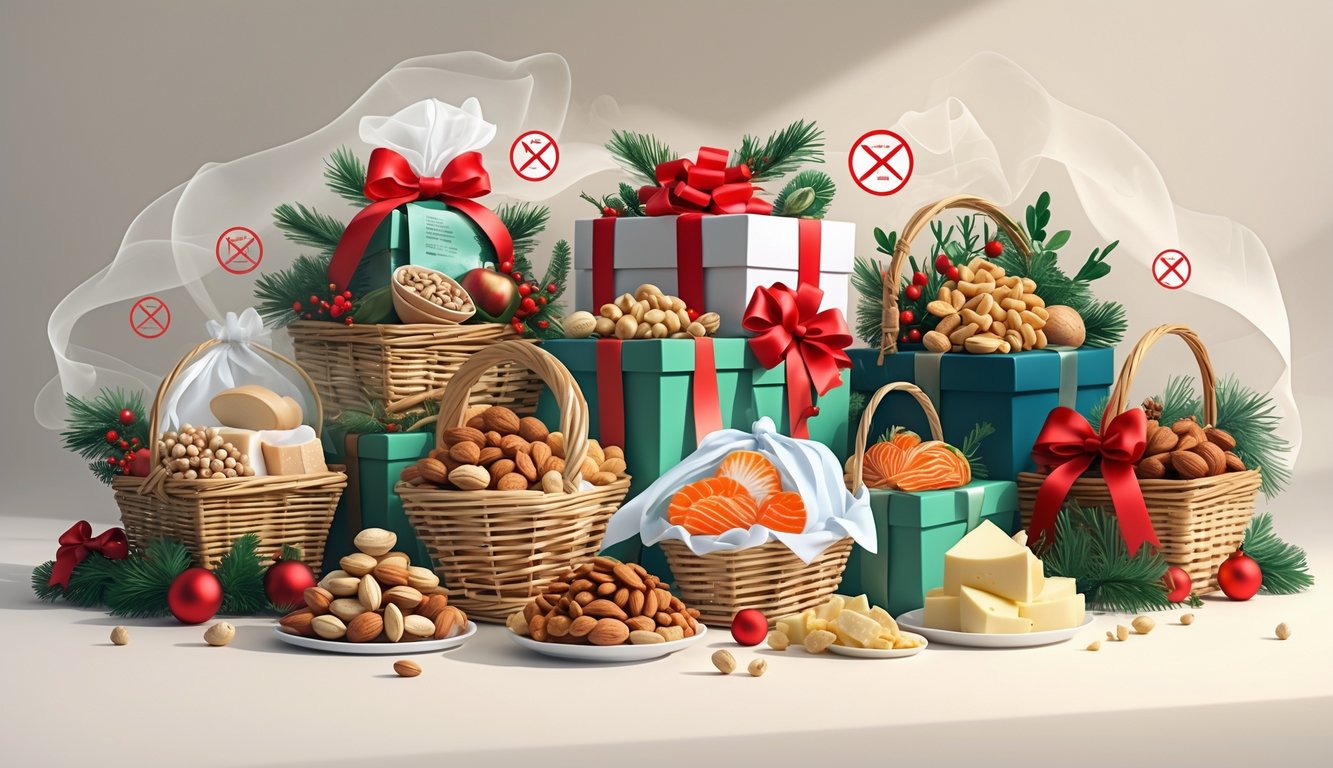
How Doctors Identify Risky Gift Baskets
Honestly, every conversation with colleagues lately is just us trying to guess which kid will end up in the ER because of a “harmless” gift basket. Allergens hide everywhere. There’s always a granola bar with “traces of nuts” or a chocolate pretzel from some sketchy factory. Gift wrap and bows don’t fix the migraine of trying to decode labels when soy protein and milk peptides show up out of nowhere.
Red Flags Professionals Look For
You’d think doctors have some secret system. Nope. It’s just endless detective work. I’ve sat through meetings where allergists vent about marzipan, imported sweets stuffed with hazelnuts, “healthy” baskets full of wheat crackers. Sometimes the only clue is a badly translated label. I found a German biscuit pack last December with “Mandeln” (almonds) hidden at the end—no nut warning anywhere obvious.
And then there’s the invisible stuff: shared processing lines, “may contain” warnings in microscopic font, dairy-free truffles leaking actual casein. Dr. Oke, who’s been an allergist forever, once vetoed an entire basket brand after learning their dried fruits had sulfites. He said, “One high schooler nearly tanked with an asthma attack from a single apricot!” I trust his horror stories more than any company chart, honestly.
Recent Food Recall Examples
February. Ugh, what a month. Not even past New Year’s and the FDA’s recall page looked like a glitchy spreadsheet—Listeria in hummus, “vegan” cookies with secret milk, random peanuts lurking in imported gift candy. Half the “nurse appreciation” baskets at my hospital? On the recall list by March. But, let’s be real, who actually checks the FDA database unless they’re already panicking? Nobody. Not even my most anxious friend.
That 2024 nut recall—yeah, the one where a supposedly “nut-free” luxury snack brand (think overpriced airport kiosks and those online “deluxe” baskets) pulled everything after almond DNA showed up in trail mix. Salmon recall over the holidays, too. People keep sending smoked salmon baskets—like, do they not know about listeria and pregnant women? Or toddlers? If you still trust mass-produced gift baskets, I’d like to borrow your rose-colored glasses. Sure, FDA recall updates and ER warnings about dangerous gift foods exist, but who’s refreshing those in real time? Allergy season is just… always now.
Advice for Safe Holiday Gift Basket Giving
December hits and suddenly everyone’s bulk-buying snacks for baskets—most aren’t even labeled, just a weird faith that “everyone eats these.” Not true. I’ve seen people land in the ER because someone guessed wrong. And the vegan friend? Still hungry, every time.
Choosing Allergen-Free Options
Picture me, squinting at cheese straw packaging in bad grocery lighting, trying to decode a list of ingredients that’s longer than my last tax return. “Nut-free” on the front means nothing—dig for tree nuts, peanuts, soy, dairy, sesame, all of it. Did you know over 9% of ER pediatric visits last holiday season were allergy-related? Aunt Linda still drops chocolate truffles (with every possible allergen) on top of the fruit. Classic.
If you want vegan or “safe,” stick to brands like MadeGood or Enjoy Life—at least they try with cross-contamination. Random bulk stuff? Why play allergy roulette. Even granola bars and popcorn sneak in milk powder or soy, and “gluten-free” is a joke if you don’t check for barley/malt. My friend learned that the hard way—malt = barley, and that was not a fun week.
Best Practices for Homemade Baskets
It’s not just the snacks—it’s the kitchen. Last year I baked ginger cookies for the teacher’s lounge, then realized my spatula had peanut butter on it two days earlier. Bleach wipes? Not enough. Separate utensils or forget it.
Label everything. Brand, production date, whatever, because I’ve watched someone react to cookies their own mom baked. Dr. Meghan Martin (pediatric ER) straight up says: “If in doubt, go store-bought with labels.” She’s seen too many “homemade” disasters. Family relishes, unlabeled jams, random baked goods? I stopped adding those. Too risky.
Don’t guess on dietary needs. Ask. Ruin the surprise if you have to. Better than ruining someone’s holiday. If I’m not sure, I go with plain packaged fruit, water crackers, or sealed tea bags—boring, but way less drama.
Resources for Food Allergy Awareness
Nothing kills “holiday cheer” like second-guessing every snack in a basket. If someone’s had a reaction, it’s never the obvious stuff. It’s the label you missed, or the “nut-free” sticker that means nothing. I just want tools that work, not guesses.
Educational Videos and Guides
I watched this “food safety training” video my aunt sent—total joke. Real help? Detailed videos that actually show cross-contact, or allergists explaining how “may contain wheat” isn’t just legalese, it’s a nightmare for celiac families. Food Allergy Safety resources have PDFs, interviews, and checklists—actual substance.
I love allergy-friendly cooking demos where nutritionists point out hidden dangers mid-recipe. Top-9 allergens, real stories, not stock footage. One video showed someone catching a label mistake, then demoed an EpiPen—not some mystery “injector.” If a guide isn’t practical, skip it.
Support Networks for Allergy Sufferers
Scrolling forums for allergy advice is mostly a waste—either ghost towns or sponsored nonsense. The best help I’ve found? Tiny support groups run by nurses and exhausted parents. Way more useful than big, generic forums. FARE’s online forums sometimes have actual allergists who don’t sugarcoat: “Carry two auto-injectors, because ambulances get stuck in traffic.”
People share where to buy snacks that aren’t $15 a box. FaceTime meetups go off the rails—last one, a dad swore sesame was in jellybeans. You get disaster stories, but also real tips. Text alerts, checklists, and once, a chef who revamped their kitchen for allergies. Try getting that from a pamphlet.